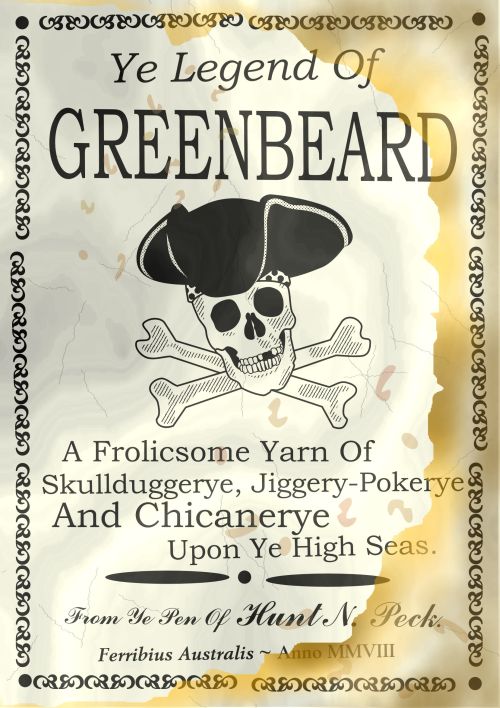
The path under the canopy of the trees was indeed dark, but not pitch-black. There was a bright moon, but the sky had clouded over and the moonlight came only in occasional beams through gaps in the overcast. One of these moonbeams revealed Israel Feet and his horse walking carefully back up the path. He and his mount were both ectomorphic, and haloed in the moonlight they made a sinister sight.
Behind him Bulbous Bill Bucephalus struggled cursing from the undergrowth, clutching the rum-bottle to his chest.
Captain Greybagges went to reply, but a stout man, one of his captors, stepped up to the bench and whispered in the Magistrate’s ear.
"What? In the name of all that's sacred!" he growled in a harsh deep voice. He shouldered the beadles roughly aside, reached down, and with a huge hand, the knuckles the size of walnuts, he hurled the board and the granite slabs from Captain Greybagges's chest with a clatter. The Captain took a vast gulping breath, and another, and struggled to sit up. The tall man helped him with an arm around his shoulders. He turned to the bench;
“Solomon Pole’s Homecoming!
The ravens croaked on London’s Tower, soot stained the cold wind black,
The bitter rain fell in slanting sheets when Solomon Pole came back,
An ancient lurking street-hawker sold him an ancient mutton pie,
And when he bit into its rancid meat a tear came to his eye.
Street-urchins followed him, wagering whether he would finish that meal,
When he swallowed it to the very last crumb they knew he was a man of steel,
He trod a tavern’s sawdusted floor and bought a pint of bitter ale,
And drank it down to the very last drop, even though it was flat and stale.
‘There once sat Spring-heeled Jack, on that very tavern stool,
‘He had an idiot’s leer and cross-ed eyes, but he was nobody’s fool,
‘The Bow-Street Runners came for him, well I remember that day,
‘He spotted them despite his squint, and so he bravely ran away.’
‘Where is Bess?’ said Solomon Pole, ‘she still owes me thirty bob.’
‘The landlord barred her years ago, for she would never shut her gob.’
The soot-black wind battered at the panes and Solomon shook his head,
‘She always had that mouth on her,’ Solomon sadly said.
‘I once knew a Pearly Queen in the street that is called Lime,
‘She had a face just like a leather bag and eyes as old as time,
‘She was only twenty years old, but she’d drunk a lot of gin,
‘She used to beg just around the corner, rattling a rusty tin.’
‘And I have seen a vampire mouse in a city made of cheese…..”
“Go! I will delay and misdirect any pursuit by Chumbley’s men. May your path be always downhill, and may the good Lord crown your endeavours with success! Adieu, Sylvestre de Greybagges!”
